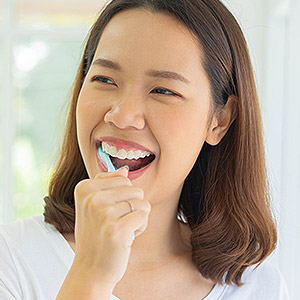
It gradually dawned on our ancient ancestors that a healthy mouth was usually a clean one. To achieve that blessed oral state, they chewed on tree bark or employed primitive toothbrushes like bamboo sticks with hog hair bristles attached to their ends.
Today, we have better tools and methods for achieving a cleaner and healthier mouth. But these advancements do little good if a) we don't use them on a daily basis, and b) we're not proficient with them.
October is National Dental Hygiene Month, highlighting once again the importance of these two points for keeping teeth and gums as clean as possible. First and foremost, oral hygiene should never take a holiday—even a day or two of accumulated plaque, the bacterial biofilm that builds up on teeth surfaces, can trigger the occurrence of gum disease or tooth decay.
But while "showing up" every day to brush and floss goes a long way toward a healthy mouth, you also need to perform these tasks well. An inadequate job can leave residual plaque that could still cause disease.
Here are a few handy tips to improve your oral hygiene routine.
Do a thorough job. Plaque can be stubborn, clinging to the nooks and crannies of teeth and around the gum lines—and it can easily be missed while brushing. Be sure, then, to thoroughly work your toothbrush's bristles into all dental surfaces. Your efforts should take about 2 minutes to complete.
Don't be too aggressive. You may need "elbow grease" to clean your floors, but not your teeth. Too much pressure applied while brushing can damage enamel and gums. Instead, go easy when you brush and let the toothpaste's mild abrasives do the heavy lifting.
Use flossing tools. Many people avoid flossing because they find it too hard or cumbersome with traditional flossing thread. If this is a problem for you, consider using a flossing tool—a floss threader or pick, or even a water flosser appliance that uses pressurized water to break up and remove plaque.
Take the "tongue test." Wondering how well you're doing with your hygiene efforts? One quick way to find out is the "tongue test": Simply swipe your tongue across your teeth just after brushing and flossing. If they feel gritty rather than smooth, you may have left some plaque behind.
Besides your personal hygiene efforts, be sure you also have your teeth cleaned regularly by a dental hygienist to rid your mouth of any residual plaque and tartar (hardened plaque)—these can also cause dental disease. Professional care coupled with proficient daily hygiene will help ensure you have cleaner mouth and better dental health.
If you would like more information on the best ways to incorporate oral hygiene into your life, please contact us or schedule a consultation. To learn more, read the Dear Doctor magazine article “Daily Oral Hygiene.”
